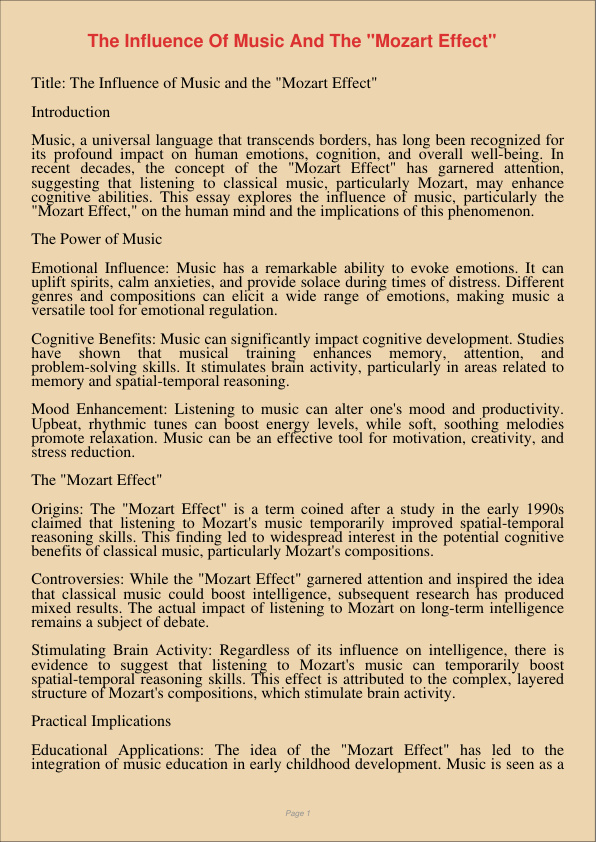The Influence Of Music And The Mozart Effect
Jan 12, 2024
mozart effect
music
Geography
Visual Arts & Film Studies

Title: The Influence of Music and the “Mozart Effect”
Introduction
Music, a universal language that transcends borders, has long been recognized for its profound impact on human emotions, cognition, and overall well-being. In recent decades, the concept of the “Mozart Effect” has garnered attention, suggesting that listening to classical music, particularly Mozart, may enhance cognitive abilities. This essay explores the influence of music, particularly the “Mozart Effect,” on the human mind and the implications of this phenomenon.
The Power of Music
Emotional Influence: Music has a remarkable ability to evoke emotions. It can uplift spirits, calm anxieties, and provide solace during times of distress. Different genres and compositions can elicit a wide range of emotions, making music a versatile tool for emotional regulation.
Cognitive Benefits: Music can significantly impact cognitive development. Studies have shown that musical training enhances memory, attention, and problem-solving skills. It stimulates brain activity, particularly in areas related to memory and spatial-temporal reasoning.
Mood Enhancement: Listening to music can alter one’s mood and productivity. Upbeat, rhythmic tunes can boost energy levels, while soft, soothing melodies promote relaxation. Music can be an effective tool for motivation, creativity, and stress reduction.
The “Mozart Effect”
Origins: The “Mozart Effect” is a term coined after a study in the early 1990s claimed that listening to Mozart’s music temporarily improved spatial-temporal reasoning skills. This finding led to widespread interest in the potential cognitive benefits of classical music, particularly Mozart’s compositions.
Controversies: While the “Mozart Effect” garnered attention and inspired the idea that classical music could boost intelligence, subsequent research has produced mixed results. The actual impact of listening to Mozart on long-term intelligence remains a subject of debate.
Stimulating Brain Activity: Regardless of its influence on intelligence, there is evidence to suggest that listening to Mozart’s music can temporarily boost spatial-temporal reasoning skills. This effect is attributed to the complex, layered structure of Mozart’s compositions, which stimulate brain activity.
Practical Implications
Educational Applications: The idea of the “Mozart Effect” has led to the integration of music education in early childhood development. Music is seen as a tool to enhance cognitive skills, creativity, and overall academic performance.
Therapeutic Benefits: Music therapy is a recognized form of treatment for various psychological and neurological conditions. It can help individuals with autism, Alzheimer’s disease, and mood disorders. The emotional and cognitive impact of music is harnessed to promote well-being.
Personal Enrichment: Beyond its cognitive and therapeutic benefits, music remains a source of joy and personal enrichment. The act of creating music through playing instruments or singing also provides a means of self-expression and emotional release.
Conclusion
The influence of music, including the concept of the “Mozart Effect,” extends to various aspects of human life. Music has the power to shape emotions, stimulate cognitive development, and improve well-being. While the “Mozart Effect” may not be the panacea for intelligence enhancement, it serves as a testament to the profound influence of music on the human mind. Whether for educational, therapeutic, or personal purposes, music continues to be a source of inspiration and enrichment in our lives, transcending boundaries and connecting us to our deepest emotions and thoughts.